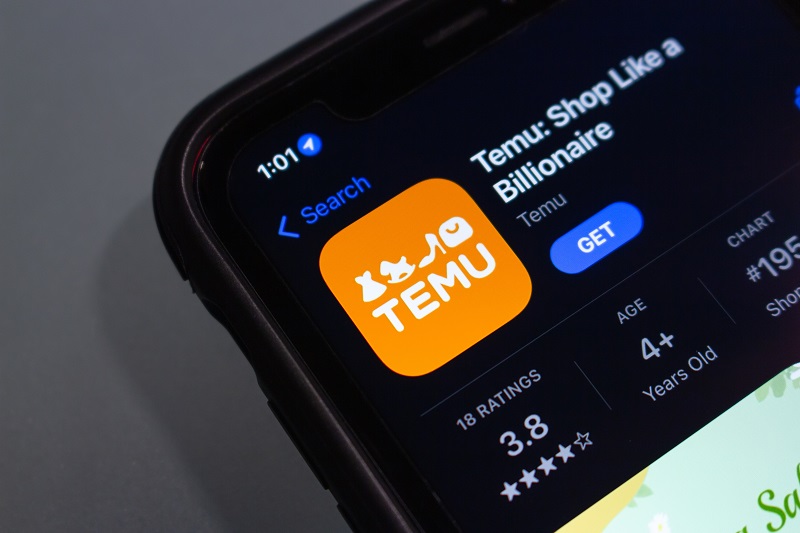In the midst of the Chiefs Super Bowl win, you may have noticed an ad promoting an online retailer named Temu. The ad encouraged viewers to “shop like a billionaire,” enticing consumers with unbelievably low prices and offering $15 million in giveaways . However, behind the facade of discounted goods lies a darker reality—one that threatens the privacy and security of users’ data.
Temu, owned by the Chinese commerce group PDD Holdings, has rapidly ascended to become one of the most downloaded apps in both Apple and Google’s App stores, seeing over 30 million new downloads every month according to Statista. Its meteoric rise, coupled with its enticing offerings, has garnered significant attention. Another thing making headlines: Class action lawsuits and congressional scrutiny over the company’s deceptive practices in collecting and exploiting users’ private information. Allegations of stealing customer financial information and embedding spyware within its app paint a disturbing picture of Temu’s disregard for user privacy and security. If you find yourself enticed by the extensive product range and competitive pricing, read on for more on what Temu is, how it operates and whether or not transactions on the platform are safe.
What is Temu?
A burgeoning force in the e-commerce sector, Temu promises a vast array of competitively priced products. This platform distinguishes itself by directly connecting consumers with manufacturers, cutting out intermediaries to reduce costs and expand product variety. Its user-friendly interface and extensive selection have made it a popular shopping destination for a global audience.
Key to Temu’s appeal is its global reach and flexibility in payment methods, catering to a wide demographic with different needs and preferences. However as Temu’s popularity soars, so does the focus on its cybersecurity measures. Given the prevalent cyber threats in online shopping, it’s crucial for consumers and businesses alike to understand how Temu safeguards user data and transactions.
Is Temu a Legitimate Website?
The question of whether Temu is a cyber threat hinges on what one considers ‘legitimate.’ It’s true that the majority of items offered on Temu are genuine, meaning that purchasers will indeed receive their products, typically within about 10 days.
However, when it comes to technology products like laptops, smartphones, and tablets, only those with a blue checkmark next to their listing on Temu are from recognized brands. Many tech items available are produced by less familiar companies.
Moreover, it’s important to be aware of certain scams associated with Temu that have gained traction on social media.
There have been instances where customers reported that the items they received differed in appearance or were of a lower quality than what was depicted on the Temu website. This discrepancy highlights the need for consumers to approach purchases with caution and conduct due diligence, especially when buying branded or high-value items on Temu.
Why is Temu Controversial?
The controversy surrounding Temu largely stems from accusations by the US government regarding potential data risks. These concerns were amplified after Temu’s affiliate, the e-commerce giant Pinduoduo, was flagged by Google for malware issues.
In the realm of e-commerce competition, particularly between Temu and Amazon, questions about which platform better serves consumer needs have arisen. However, the debate extends beyond just user experience to include compliance with international laws and regulations.
A significant part of the controversy involves a report by the US House Select Committee on the Chinese Communist Party, which criticizes Temu for not adequately ensuring that its products adhere to the Uyghur Forced Labor Prevention Act. This legislation is crucial for preventing goods made with forced labor from entering the US market.
Moreover, the report accuses Temu of exploiting a loophole in US commerce regulations. This loophole allegedly allows Temu to circumvent tariffs and other compliance requirements with US commerce laws, giving it an unfair advantage in the market and raising ethical and legal questions about its operations.
Is it Safe to Buy From Temu?
Definitively confirming the safety (or lack thereof) of purchasing items from Temu is not straightforward. If you decide to make a purchase, adopting certain precautions can enhance your security when shopping on Temu or any other online marketplace:
- For iPhone users, the “Hide My Email” function is a valuable tool. It creates a random email for your Temu registration, forwarding emails to your main iCloud account. This setup allows you to easily disconnect if the alternate email becomes a target for excessive spam.
- For those without an iPhone, it’s wise to set up a dedicated email address for use on sites where you have concerns about privacy or unwanted email traffic. This step helps keep your primary email inbox clean and reduces exposure to potential spam from online retailers.
- It’s also crucial to protect your payment information. Directly linking your bank account or debit card with any online retailer poses a risk; in the event of a security breach, your financial details could be exposed. A safer alternative is to use Visa gift cards or digital wallets like Apple Pay, Samsung Pay, Google Pay, or PayPal for online purchases. These methods offer an added layer of security by shielding your actual banking information from the retailer.
Bottom Line
Concerns over product quality and labor practices aside, it’s important to remember that in the United States, the complete protection of user data isn’t guaranteed, leaving the responsibility on individuals to choose how much personal information they wish to share and with which platforms.
It’s important to be aware that by creating an account on any platform, you’re consenting to the terms outlined in the company’s privacy policy. Therefore, if you decide to register and make purchases on Temu, it’s not accurate to say that Temu is “stealing” your data, as you’ve agreed to their terms. According to Komando, the types of data collected by Temu include names, addresses, phone numbers, birthdays, pictures, and links to social media profiles. Additionally, it gathers technical data like the operating system of the user’s device, IP addresses, and GPS locations.
Ultimately, if you’re uncomfortable with the idea of giving a Chinese shopping app this much control over how your data is being collected and utilized, it’s going to best to steer clear of Temu.




